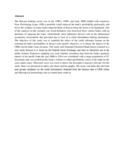Credit Reference Bureau as the Factor Influencing the Profitability of Commercial Banks in Kenya: A Case of Standard Chartered Bank, Kenya
Abstract
The Kenyan banking sector was in the 1980's, 1990's and early 2000 riddled with numerous Non- Performing Loans (NPLs) portfolio which reduced the bank's profitability profoundly and led to the collapse of many banks Imperial Bank of Kenya being the latest to be liquidated. One of the catalysts in this scenario was serial defaulters who borrowed from various banks with no intention of repaying the loans. Undoubtedly these defaulters thrived well in the information asymmetry environment that prevailed due to lack of a credit information sharing mechanism. The objective of this study was to establish the effect of the credit reference bureau on the commercial bank's profitability in Kenya with specific objective, to evaluate the impact of the CRBs on the bank's loan advances. The study used Standard Chartered Bank Kenya Limited as a case study because it is listed on the Nairobi Stock Exchange and thus its financials are in the public domain. Purposive sampling was used whereby secondary data from the bank's quarterly reports of net profits from the year 2000 to 2014 was considered with a target population of 55. Secondary data was used from the bank's website to collect profitability ratios of the bank for the years under study. Microsoft excel was used to derive the descriptive statistics relevant for this study. Data was presented in tables, pie charts and bar graphs. The study concludes that the bank puts greater emphasis on the credit information obtained from the bureaus that is CRB Africa and Metropol in determining who to extend their credit to.
URI
https://www.semanticscholar.org/paper/Credit-Reference-Bureau-as-the-Factor-Influencing-A-Tuwei-Sakataka/e3a3467153689c14f6b7673340edde7176aa76f6http://hdl.handle.net/123456789/4661
Collections
- Journal Articles (BE) [333]

